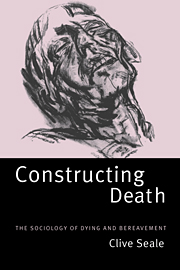4 - Medicine, modernity and the risks of life
Published online by Cambridge University Press: 28 October 2009
Summary
In a religious society questions of the meaning of life and death do not arise; the world is as it is. Such questions are the product of modern conditions, where the place of religion as a set of unquestioned background assumptions about the nature of the world has come to be challenged. Chief among such challenges in European societies has been that from science, which has long represented the world as amenable to human control, disputing the influence of supernatural agency and undermining faith in life after death. Disappointment at perceiving God's incomprehensible punishment of the good and the wicked alike and the perception that alternative religions command the allegiance of whole populations are additional factors which have contributed to the perception of the death of God that characterises modern consciousness.
Medicine, and the sciences on which it chiefly draws, play an important part in providing answers to pressing existential questions, even though the primary purpose of medicine has been to provide a technical means for resisting the effects of nature and our embodiment. The issue of why we must die, as we saw in chapter 2, has been the subject of speculation by biologists. Apart from such explicit meditations, though, medicine and its associated sciences present a series of discursive representations of death that both reflect and help to form the thoughts and feelings of ordinary people in understanding their own deaths in a world relatively distanced from the certainties of traditional religion.
- Type
- Chapter
- Information
- Constructing DeathThe Sociology of Dying and Bereavement, pp. 75 - 90Publisher: Cambridge University PressPrint publication year: 1998



